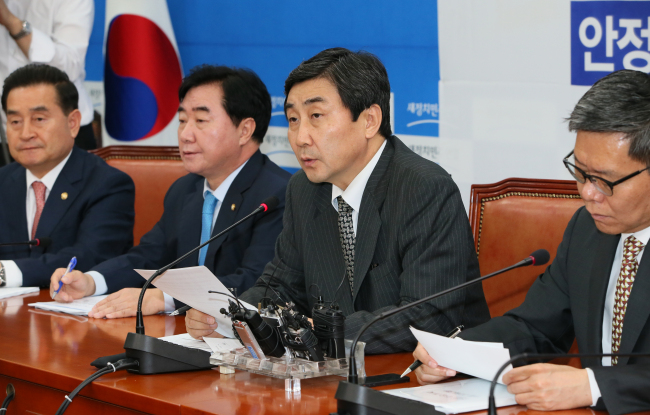Lawmakers from the main opposition party on Tuesday upped their pressure on the government to stop its attempt to censor cultural contents amid the allegation that some artists and their projects were banned from government financial support for political reasons.
They claimed the government was singling out some liberal-leaning artists to deny them support from the nation’s largest funding agency, a move that Rep. Lee Jong-kul, floor leader of the New Politics Alliance for Democracy, cast as a “return to anti-democracy.”
“The Park Geun-hye administration has tightened its grip on the arts and culture. I warn against its attempt to return to the era where democratic values were banned and denied. We will do whatever it takes to uphold the right to freedom of speech and improve the culture industry,” Lee said Tuesday.
 |
| Rep. Lee Jong-kul. Yonhap |
His remark followed the NPAD lawmakers’ revelation during the parliamentary inspection into government agencies. Rep. Do Jong-hwan of the NPAD charged that Arts Council Korea manipulated the funding list to exclude those critical of the government, such as directors Lee Yun-taek and Park Geun-hyeong.
Lee’s play titled “A Time to Offer Flowers,” was excluded from the list, though his play was awarded the top score in the evaluation process. Lee had supported Rep. Moon Jae-in in the 2012 presidential campaign.
Park, whose play had a scene where actors mock President Park’s policy, failed to bring his play to the final list in first place. Park had said in a media interview that his political satire led to his project’s outright withdrawal from the list.
As the scandal over censorship escalates, artists have held press conferences to denounce what they called “politically motivated” interference in cultural affairs and called for the government to stop censoring art products.
“Freedom of speech is one of the greatest achievements from the past democratic movement. We have fought against the dictatorship really hard to achieve these goals. We believe censorship is the government’s attempt to control the public and undermine democratic values,” an association of advocacy groups for artists said in a press conference.
But Arts Council Korea denied the allegation, saying that the agency had never considered political factors in determining the list for funding. In a statement, the agency said that they had simply laid out individual views about Park’s plays and that Lee’s work was excluded from the list as he had frequently received financial support from the agency before.
Critics said the controversy well reflects the transition period of Korea’s democracy that still falls behind advanced nations, but downplayed the NPAD attempt to associate the government’s move with steps taken during the dictatorship, as they have different motives.
“Fundamentally, a democratic government has the duty to endorse civil society. Korea is still struggling with this issue. The trend nowadays in advanced nations is to minimize the interference of the administration. It would be problematic if the level of (government) interference continues to rise,” Lee Taek-gwang, a professor of cultural studies at Kyung Hee University.
“But it is different from what we witnessed during dictatorship. Back then, the government engaged in censorship under the logic of national security. As the overall society democratizes, the government also becomes one of the interest groups. Rather than making a direct interference, it is more so that the government is acting on behalf of its interests. The case for dictatorship is more of political rhetoric,” said Lee.
By Yeo Jun-suk (Jasonyeo@heraldcorp.com)

